Writing a CV for a career change can be tough: you’re probably worried that employers won’t see past your previous job titles, or that your lack of direct experience will hold you back.
This guide, along with its career change CV template, will help you craft a new CV which reframes your past experience and showcases your transferable skills to get you into the new field you want to enter.
Career change CV template
Use this CV template, complete with tailored advice, to help create your new career change CV.
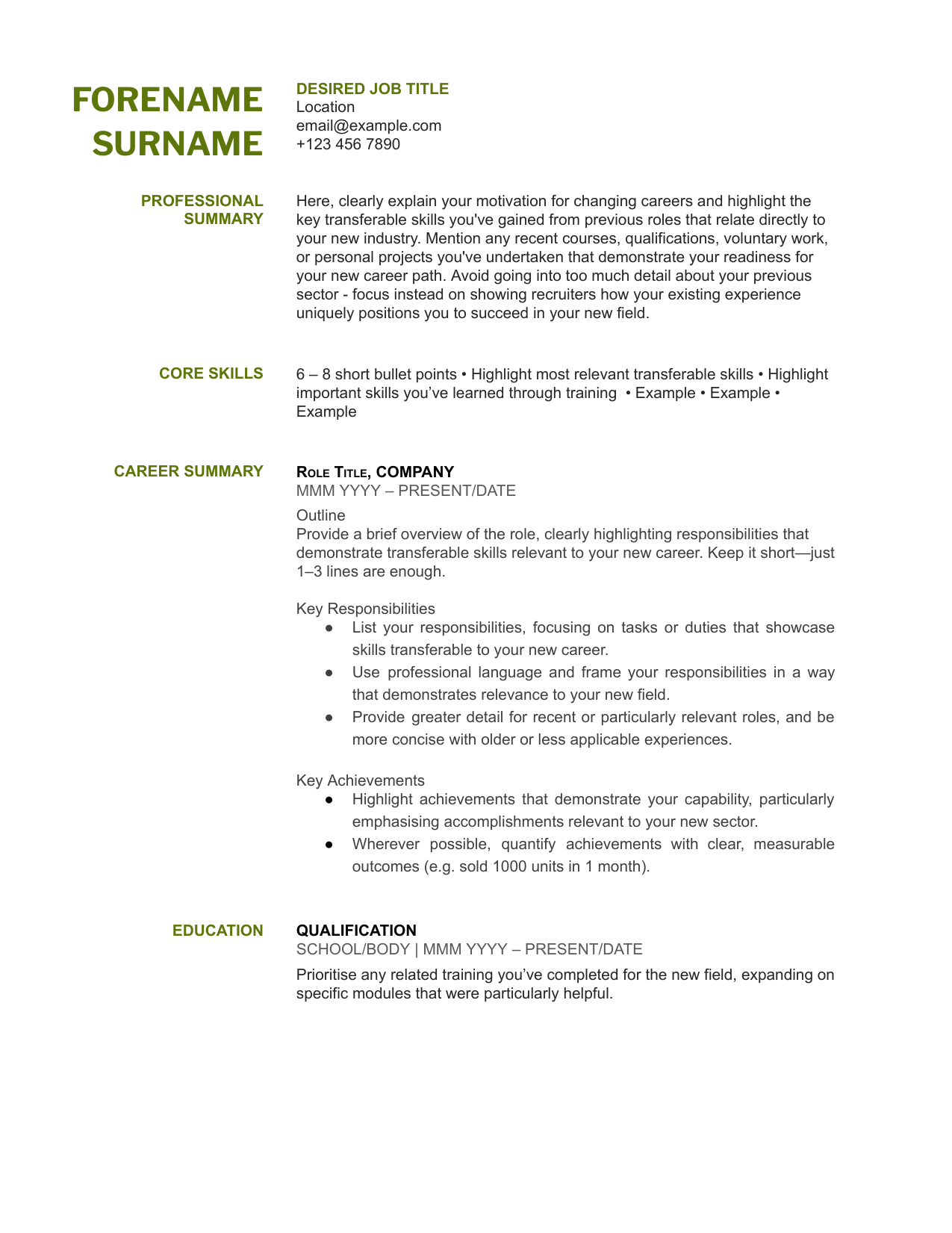
Download options: Google Docs | Microsoft Word
How to write a career change CV
When switching industries, writing a CV has a slightly different job to do. Rather than simply listing past roles, it needs to convince recruiters you have all the essential skills – even if your previous job titles don’t seem relevant at first glance.
That means carefully highlighting your transferable skills, strategically reframing your past experience, and confidently showcasing your enthusiasm and commitment to the new direction you’re taking in every part of your CV.
Writing a career change CV profile
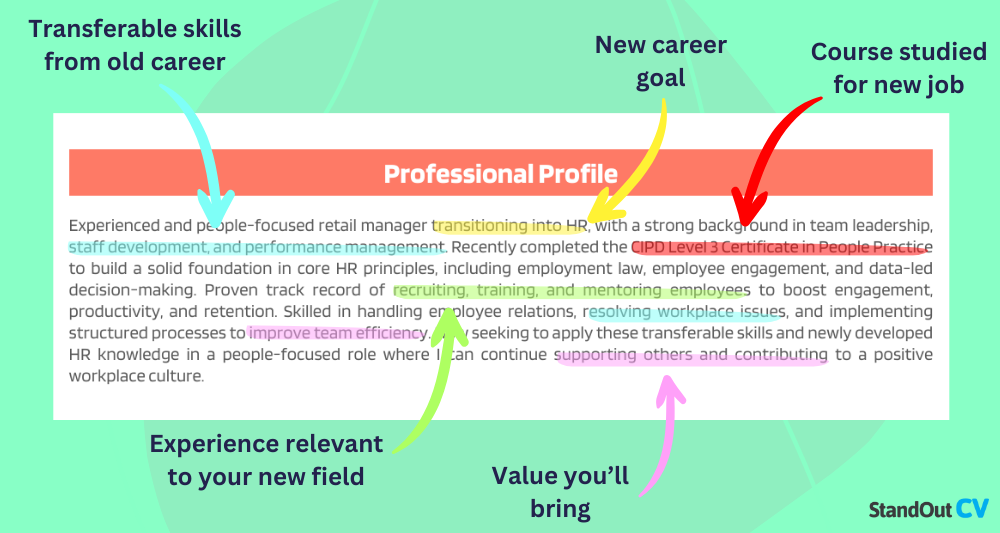

The profile at the top of your CV is crucial for career changers. Recruiters will typically glance at your profile first, so it needs to make a strong case for your career switch.
Use this section to explain briefly why you’re changing careers, highlighting new skills you’ve recently gained, as well as clearly stating your enthusiasm and aspirations for the new role or industry.
Clearly mention any recent courses or training you’ve completed, highlighting your proactive steps to build relevant expertise. Don’t be shy about expressing genuine enthusiasm: employers appreciate candidates who are passionate and committed.
Your profile should help recruiters quickly understand why you’re a strong candidate, even without direct industry experience.
Highlighting your transferable core skills
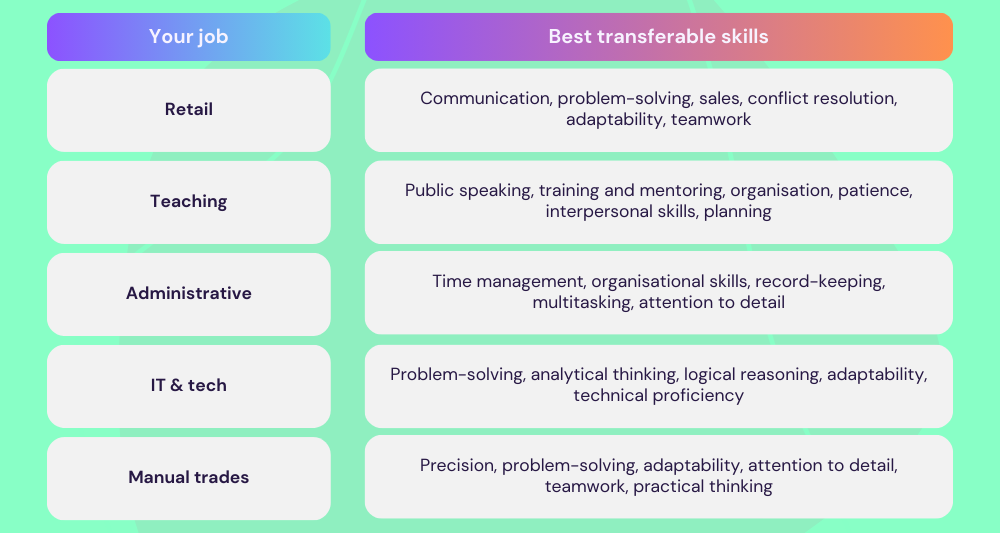

The great news for career changers is that employers care most about skills and competencies. Regardless of industry, key skills like problem-solving, leadership, communication, and project management are always in high demand.
To identify your strongest transferable skills, think carefully about your previous jobs: what were you consistently praised for? Which tasks did you excel at? Use these insights to shape a core skills section that highlights exactly what recruiters want to see.
Researching job descriptions in your new field will help you pinpoint industry keywords, ensuring your CV ticks all the right boxes for any recruiters that scan through it.


Making old work experience relevant
Don’t assume your previous jobs aren’t relevant – they almost certainly are. The trick is simply in the way you present them. Instead of listing every duty you performed, focus on highlighting the tasks and achievements that showcase your transferable skills, using action words where appropriate.
Example: Switching from Accounting to marketing
For instance, imagine you were an accountant looking to move into a marketing role. Instead of simply listing your accounting tasks, you would reframe the experience to emphasise any exposure to marketing, data analysis, or cross-functional collaboration.
Old job description (targeted at accounting) ❌
- Prepared monthly financial reports and reconciliations.
- Monitored budgets and provided forecasts for department heads.
- Ensured compliance with company finance policies and external regulations.
New job description (targeted for marketing roles) ✅
- Collaborated closely with the marketing team to track campaign budgets and analyse ROI.
- Produced data-driven reports to help optimise marketing spend and improve campaign targeting.
- Supported cross-departmental planning for promotional events, ensuring alignment with financial strategy.
This second version draws out relevant marketing-adjacent skills such as data analysis, campaign evaluation, and collaboration with marketing teams. Even though the role was finance-focused, it now reads as highly relevant to a marketing context.
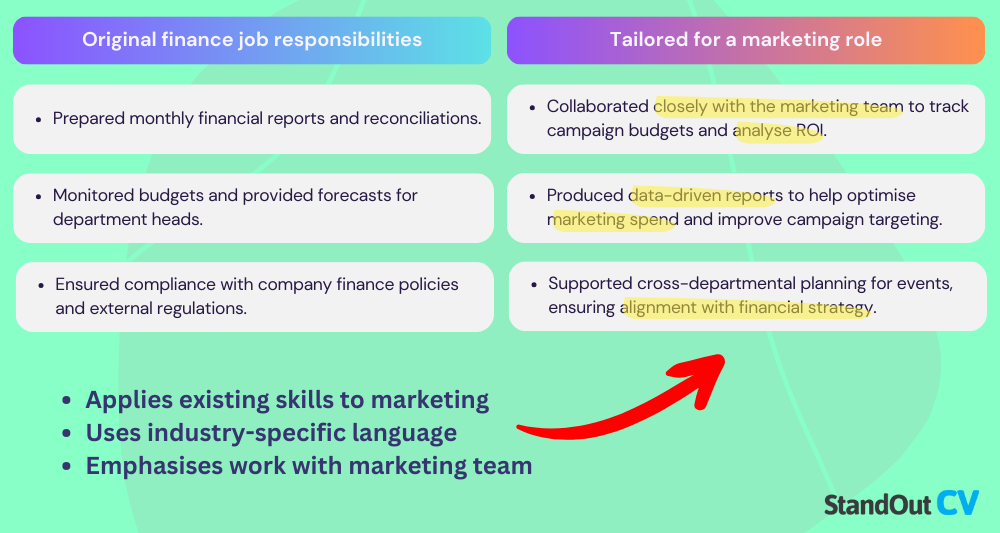
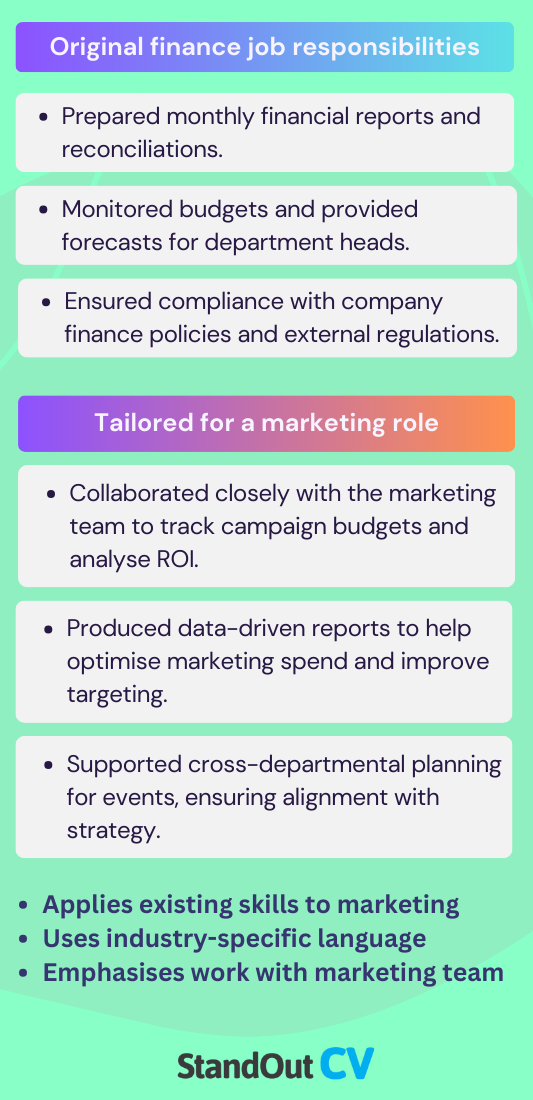
Think creatively about your previous work experience and find those hidden connections that directly apply to your new field. By emphasising these relevant areas, your past roles suddenly become your greatest assets rather than obstacles.
Outlining your new training and qualifications
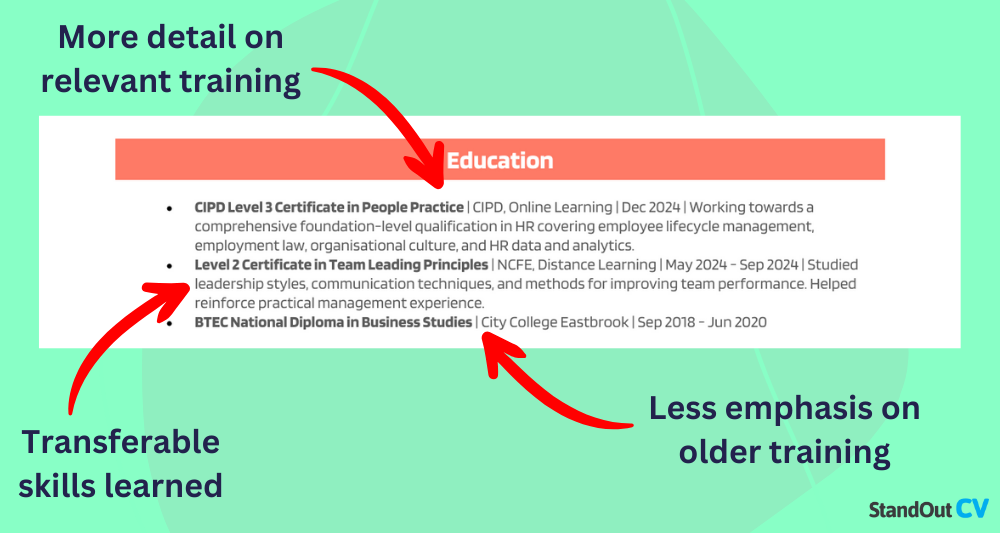

Have you taken online courses, gained certifications, or attended training events related to your new career? Make these achievements prominent on your CV. Even if they’re ongoing, mentioning your commitment to professional development and education reassures employers that you’re serious about the transition.
Clearly include what each qualification or training involved, why you pursued it, and what relevant skills you’ve gained. This’ll help you demonstrate your dedication to learning the ropes and investing in your new direction.
Enhancing your CV with additional info
When formal work experience in your new field is limited, you can strengthen your CV by showcasing things like personal projects, volunteering, or industry awards you’ve earned, and any relevant hobbies you enjoy. Mention anything that emphasises your suitability for your new role.
This sort of stuff gives employers concrete examples of your initiative, passion, and willingness to go above and beyond. Think of this as proof that you’re genuinely committed – and already developing relevant experience in your spare time.
Crafting a career change cover letter
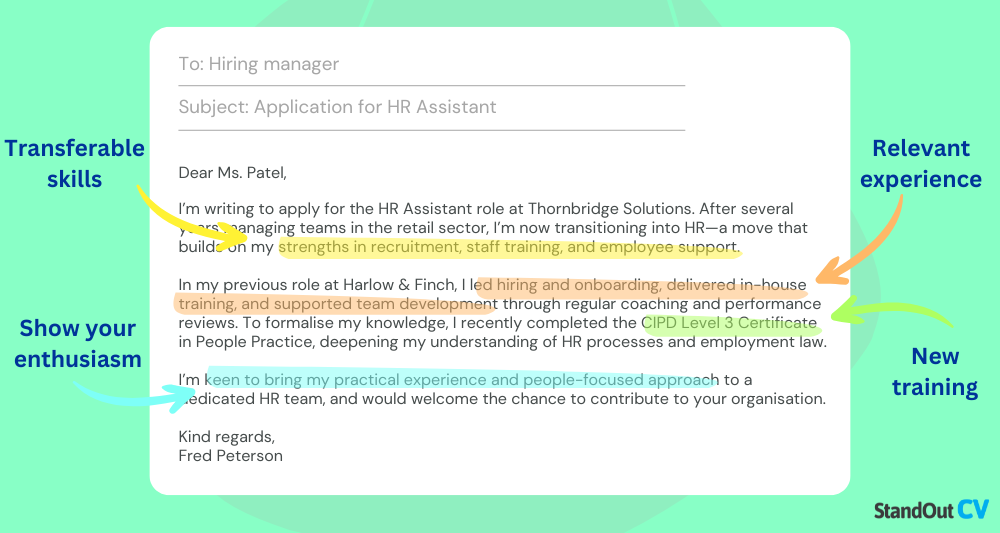
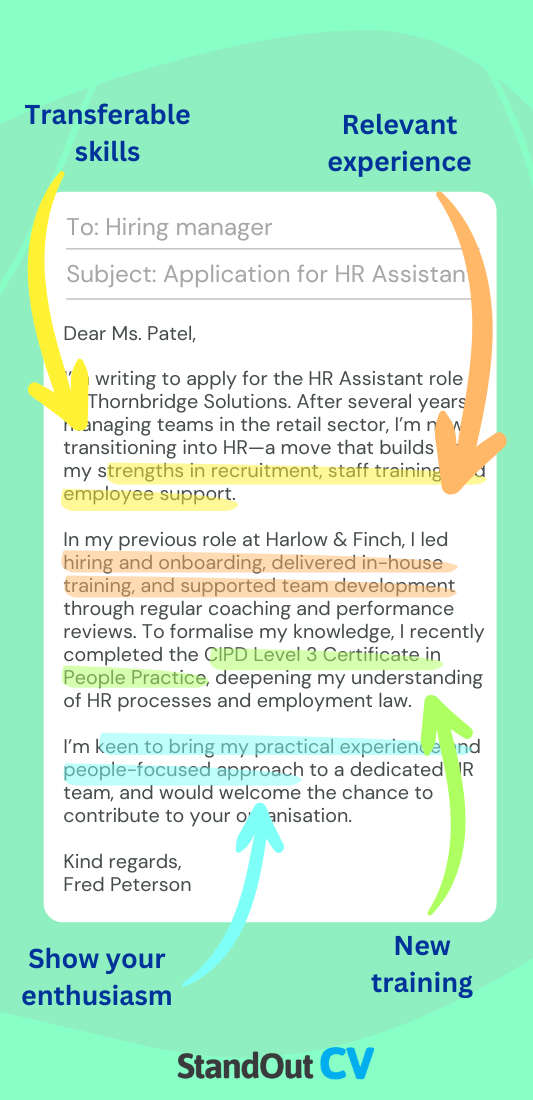
A cover letter is your secret weapon as a career changer. While your CV outlines your skills and experiences, your cover letter tells your story, clearly explaining your motivation for the career shift and how your past roles have uniquely prepared you for this new challenge.
Use your letter to address the career change head-on. Describe why you’re excited to move into this new area and what specifically appeals to you about the new role or industry. And if nothing else, most regular candidates don’t bother with a cover letter: so your one will help set you apart.
How to improve your career change CV
Writing a solid CV is crucial, but it’s just one part of the puzzle. There’s plenty of career change CV advice that’ll help significantly strengthen your overall application.
These tips will help you generate more relevant experiences, connect more meaningfully with potential employers, and make you a stronger candidate overall.
Learn new skills and qualifications
If your new industry values certain qualifications or technical skills, why not gain them proactively? Online courses, certifications, degrees, and training programs are widely available and can significantly boost your credibility and confidence when applying for jobs.
Just dedicating an hour in the evening (or maybe sneakily part of your lunch break) will go a long way in preparing you for your eventual transition to a new industry.
Network in your new industry
Connecting with industry professionals, whether through LinkedIn, industry events, or networking group, can be hugely beneficial. These connections often lead to valuable insights, advice, and hopefully even job opportunities. Plus, you’ll feel more informed and confident about your new direction.
Take up volunteer work
Experience doesn’t always have to be paid. Volunteering or taking on related side projects can provide you with practical, relevant experience, which you can do alongside your current job. Plus, these efforts clearly demonstrate initiative and genuine passion, qualities any employers love.
Follow industry trends
Stay on top of industry news, trends, and key players in your new field. Being well-informed helps you discuss your career change more confidently and authentically during interviews, proving you’re committed and knowledgeable about your new path.
Emphasise your new training
By far the best thing you can do if you’re hoping to enter a new field is to start actively training for the role. Not only will it prepare you for the skills you’d be expected to have, you’ll reassure recruiters of your genuine interest in the pursuit.

If you’ve studied and earned a particular qualification, you should make it clear: as well as putting it in the Education section, consider adding it to your Core Skills section, or even frame it as work experience.
Prepare for common career change interview questions
While most candidates have to guess what an interviewer will ask, you can be pretty sure of a few: why the switch? How do your skills equip you for this new industry? What specifically draws you to this field? Being well-prepared for these inevitable interview questions will help you perform confidently.
Adjust your job title
You might be a Secondary School Teacher now, but putting that at the top of your new Welder CV will only confuse recruiters. It’s fine to adjust your CV personal details section to reflect the job you’re hoping to break into.
Similarly, make sure your LinkedIn and other professional profiles reflect your career change ambitions.


FAQs
How do you explain a career change on a CV?
Briefly address your career change in your CV profile, clearly stating why you’re making the move and emphasising transferable skills relevant to the new industry. Reiterate this in your cover letter, too. When describing past roles, focus on relevant achievements and competencies rather than job titles.
How do I write a personal statement for a CV when changing careers?
Use your personal statement to highlight your motivation for changing careers, your enthusiasm for the new field, and the key transferable skills you’ve acquired. Clearly communicate what you’re aiming for in your new career and why your past experience uniquely positions you for success.
How do I update my CV after a career change?
After you’ve successfully switched careers, immediately add your new role to your CV, clearly outlining responsibilities, achievements, and newly gained industry skills. Remove older, less relevant roles or condense them to ensure your CV stays concise and focused.
How do I say I want to change my career path?
Be upfront yet positive about your career shift: express genuine enthusiasm for the new field and highlight your proactive efforts (like training or volunteering) that demonstrate your commitment. Avoid negativity about your previous career; focus instead on the opportunities you’re excited to pursue.
What if my qualifications are in a completely different field?
Don’t worry if your qualifications don’t directly match your new field; instead, highlight any transferable skills and new training you’ve pursued. Clearly show employers how your previous education and experience have equipped you with valuable skills that make you an asset, regardless of the field you originally studied.



